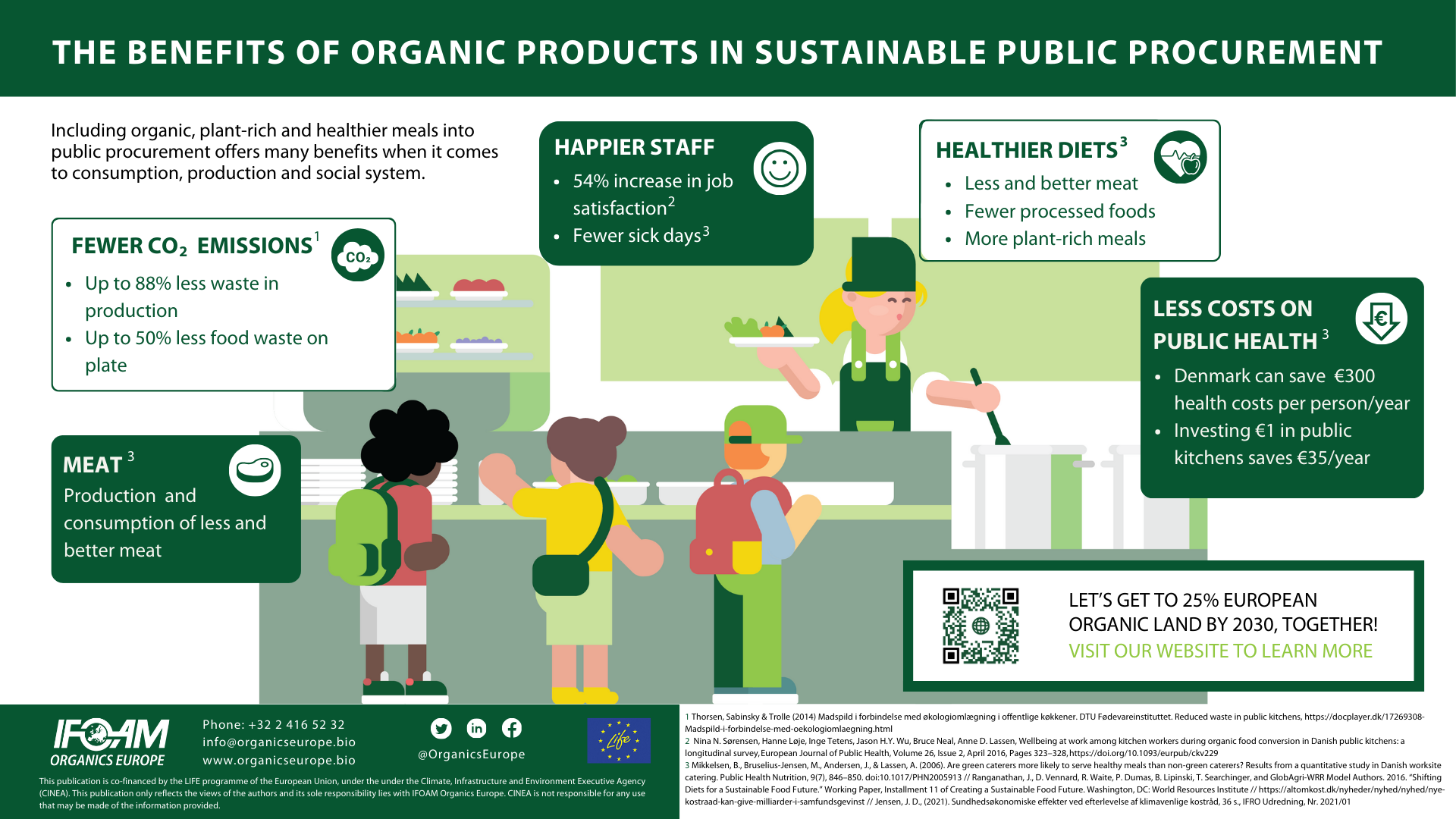The 7 key policy recommendations on sustainable food public procurement
The Food Policy Coalition’s policy recommendations on food procurement support procurement as a tool that contributes to the systemic transformation of our food system. The seven recommendations by fourteen organisations active in the field of food and agriculture aim to contribute meeting the commitments made with the EU Farm to Fork Strategy, and more global objectives such as the United Nations’ Sustainable Development Goals.
These recommendations support a holistic approach to food public procurement and take into consideration intertwined subjects like organic agriculture, animal welfare, public health, social considerations, and proximity food economy. They are based on the simple and powerful idea that public procurement is a key lever to transform the EU food system.
The seven recommendations say that minimum mandatory food procurement criteria should:
- Go beyond Green Public Procurement (GPP) to consider environmental, social and health concerns, such as organic, fairtrade, agroecological practices, animal welfare and waste. This would ensure policy coherence (for example with the Farm to Fork Strategy);
- Be ambitious and progressive over time, to avoid creating market distortions all by achieving a true shift towards new consumption and production models across the EU;
- Be accompanied by national and international roundtables of procurement experts that would support the implementation of public procurement at the national level;
- Be substantiated by ambitious, regularly-updated, multi-dimensional national dietary and nutrition guidelines to help procurers implementing EU public procurement criteria;
- Go hand-in-hand with financial and technical support to public buyers, to allow a more strategic use of procurement, stimulate research, and assess and enable factors for a more systemic change and their impacts;
- Be paired with compliance with labour and employment standards, especially the International Labour Organisation (ILO)’s, to ensure socially responsible procurement, encourage the re-vitalisation of rural areas and include the social economy and social cooperative along the whole supply chain.
- Contribute to stimulating greater clarity when it comes to local food public procurement rules, to avoid infringing the rules of the common market when giving the necessary priority to shorter supply chains.

Organic products, part of sustainable public procurement
These recommendations are clear and achievable. They should also be read in conjunction with the leaflet published by IFOAM Organics Europe in February 2022, Making organic products in sustainable public procurement happen.
This leaflet identifies specific issues to achieve ambitious organic public procurement: build capacity of NGO’s and organic sector, set a national/regional target for organic in sustainable public procurement, introduce an organic certification scheme, transform the procurement system step by step, and establish mentoring systems.
Some of these ideas can be directly related to those presented by the Food Policy Coalition. Organic public procurement, and sustainable food procurement in general, needs to be based on ambition, progressiveness, clarity, and reliability, building network and support between authorities and procurers, both in terms of practices and financial means. Those two documents make the case for this.
Sustainable public procurement and organic food are part of the solution to making the forthcoming Sustainable food system framework initiative a truly useful, transformative moment by making the most of the sustainable food public procurement leverage potential.
Background information
IFOAM Organics Europe, other associations and NGOs jointly advocate in the context of the Food Policy Coalition. In December 2021, the Food Policy Coalition’s Public Procurement Task Force formulated joint policy recommendations on sustainable food public procurement. This comes after the publication of the briefing paper Sustainable Public Procurement of Food: A Goal Within Reach, highlighting the advantages and leverage effects of sustainable public procurement.
IFOAM Organics Europe is part of the EU Food Policy Coalition. This coalition was created informally in 2019 and works towards policy integration and alignment at the EU-level to facilitate the transition to sustainable food systems. It brings together civil society and organizations working towards refining and advocating for a shared vision of sustainable food systems at the EU level. Partners include NGOs from a broad spectrum working on food systems, grassroots social movements, farmers organizations, organizations of fishers, trade unions, think tanks, scientific and research groups.
Visit www.foodpolicycoalition.eu to learn more and follow the coalition’s activities on Twitter using @EU_FPC.

